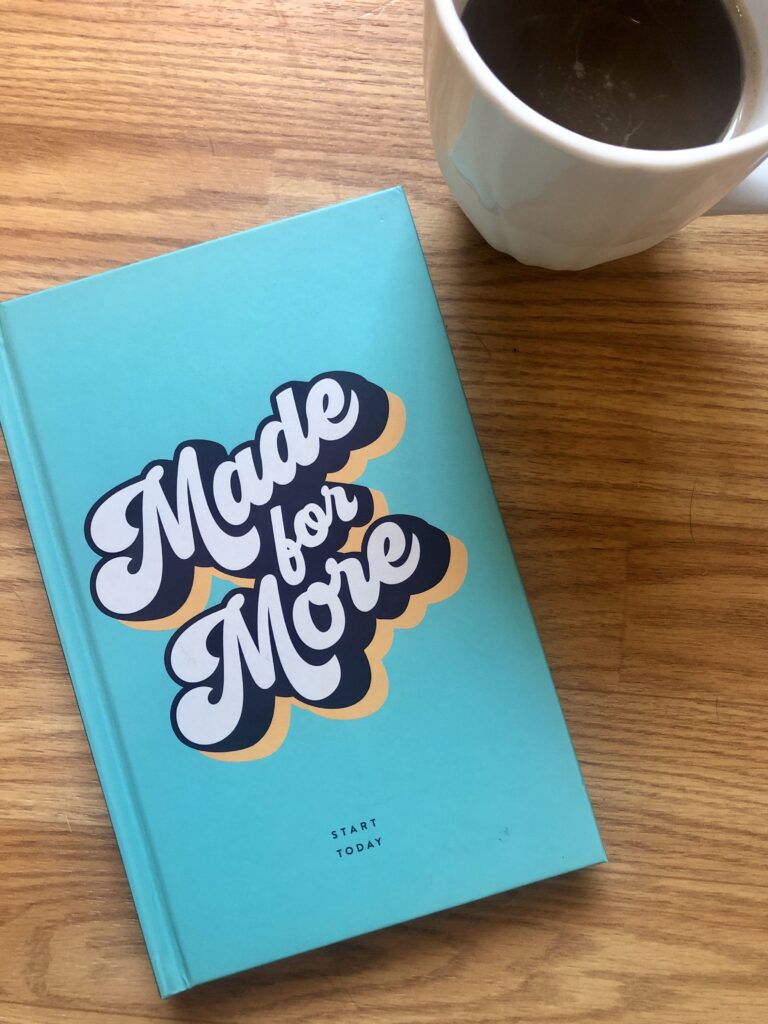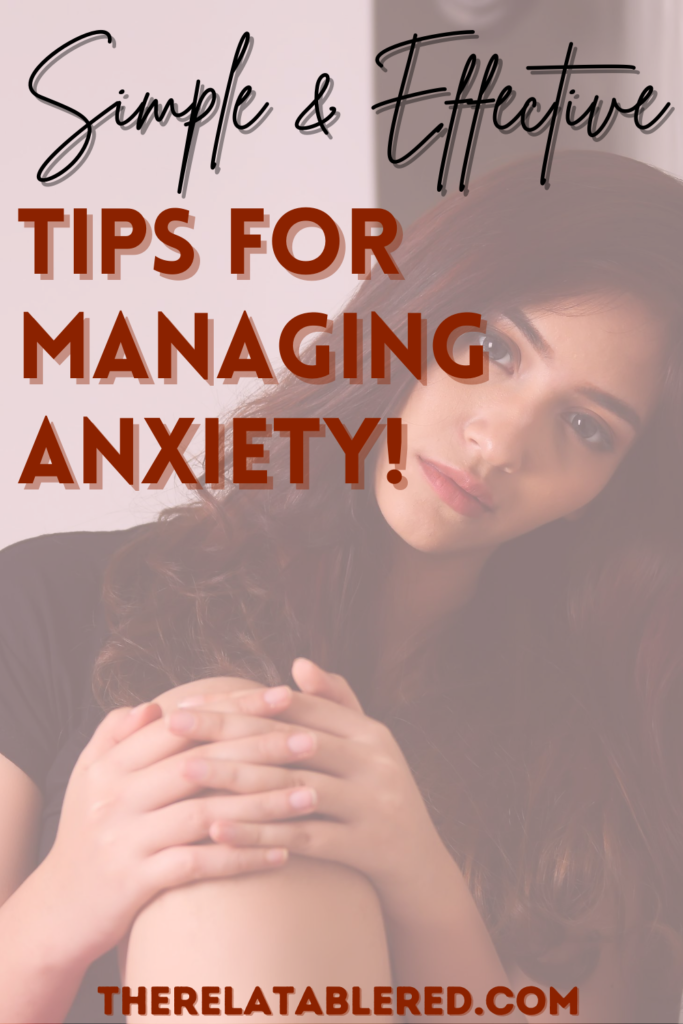Ask and you shall receive! I got a request from a friend on Instagram asking me to speak on managing anxiety. First let me say, I would diagnose myself as a mildly anxious person all the time with more intense bouts of anxiety, situationally and during specific times in my life. Which, if I had to assume, would be the case for many of us. Over the past few years, I feel like I have finally made effective and intentional strides at managing and even preventing anxiety. So of course, I want to share these tips that have actually worked for me with you guys!
Note: I am not a mental health professional but because I have had success in my own life, I wanted to share some things that helped me in case they can be helpful to someone else.
Proactively Managing Anxiety
You will undoubtedly have anxious moments and seasons of life. We all do. And when they arise, you’ll need some tips for managing and coping with that anxiety, which I’ll share in a little bit. BUT, give yourself a fighting chance. Be proactive, rather than reactive to anxiety.
Anxiety is very real. It can be absolutely debilitating. And it may very well require professional counseling and medication. And THAT’S OKAY. With that being said, set yourself up for success as best you can with the following proactive measures
1. Exercise
I don’t care if I sound like a broken record. Exercise is king. Movement is crucial. I often choose movement on my rest days from the gym simply because of the mental state it leaves me in. Shut your mind off, get a little sweat in, and generate some feel good energy. Endorphins are real folks. Picture it, a guaranteed way to get a flood of endorphins to help combat feelings of anxiousness on a consistent basis. I use exercise as a preventative method and I recommend it 100%. But even if you don’t exercise regularly, changing your physical state will help you change your mental state. Feeling anxious? Take a walk. Do some stretching. Get some kind of movement in and take note of how much better you feel.

2. Be conscious of your caffeine intake
It’s like clock work. If I am feeling anxious for no particular reason, it is due to too much caffeine 99% of the time. When you are feeling anxious, you may experience increased heart rate, sweating/cold sweats, and racing thoughts. Not so coincidentally, you are likely to experience those very same symptoms when you’ve had too much caffeine.
Being intentional with your caffeine intake is one of the simplest tips for managing anxiety. Ask yourself, “Do I really want this coffee?” Or is it just habit for you to have it? Remind yourself that it may result in some anxiousness that would be best managed by exerting energy. Are you prepared to go exercise/clean/run errands or will you be okay to sit in the anxiousness? And if you want it, that’s okay but be aware of how much you may have already had that day, how much you’ve eaten, and whether or not it will affect your sleep.
3. Sleep
Even if it’s well managed, anxiety can be emotionally and physically exhausting. Getting adequate sleep is so important for your overall health. In fact, I even spoke about your sleep’s impact on your weight here. If you don’t get enough sleep, you’ll be quick to grab an afternoon coffee which will keep you from getting adequate sleep again the next night. And the vicious cycle continues.
Additionally, anxiety multiplies exponentially under pressure and time constraints. If you’re not getting enough sleep and therefore snoozing your alarm, you’re ultimately starting your day “behind” the 8 ball and trying to catch up all day. Running late will cause your anxiety to be high from the moment you wake up and have an effect on the rest of your day. Getting enough sleep is a simple but effective way of being proactive in reducing your anxiety.

4. Daily gratitude and affirmations
Begin every day grounding yourself in gratitude. Pick 5 small things from the past 24 hours that you are grateful for and write them down. Not only will you start your day with a grateful heart, but you’ll be on the hunt for gratitude for the rest of the day.
I use a Start Today journal for my daily gratitude and intentional goal setting. The top of the page is 5 things you’re grateful for and then it is followed up by 10 dreams you made happen. You write these 10 dreams down every day as if they have already happened.
I’ll be the first to say it, I thought affirmations were kind of woo wooey. When I started pursuing personal growth and development, all the affirmations I read felt a little “fluffy” and like they wouldn’t be all that helpful. But then I slowly realized through my Start Today journal that the first few of my 10 dreams, because they are written as if they are already true, are kind of more like daily affirmations.
Listen, y’all know I love goal setting and the remainder of my list are more specific, tangible goals. But the first few are the kind of goals that you never stop working at. And because of that, they are more like affirmations.

Examples:
I won’t leave you hanging. I’ll give a couple of mine in the hopes you’ll feel inspired to start writing down a few affirmations along with your gratitude to help you proactively manage anxiety throughout the day.
“I am confident in every room”
“I do not let fear of failure or anxiety make my decisions”
When I face something in my day that makes me anxious or shakes my confidence, my mind instantly goes back to these “affirmations” that I have written as if they are already true. I’ll begin to feel anxious about putting myself out there in a blog or starting a new endeavor. Or I get anxious and begin to doubt my abilities if I have a meeting with a client(for my day job.) And then those affirmations come right back to me. I tell myself, “no, I don’t let anxiety make my decisions.” And “I am confident in every room, no matter who is in it with me.” It is a constant work in progress and writing them every day reinforces them in your mind.
5. Front loading
This one is more applicable if you’re in a relationship and/or spend a lot of close-knit time around friends or family. It’s kind of a joke in my relationship. My husband says, “Oh you’re gonna do the thing.” The “thing” is essentially where I plan and discuss my expectations for the next day –front loading. Obviously, I only do this when my tasks for the day include him (or someone else.)
For example, Friday evening I’ll say, “hey babe, can we do the thing?” And we will discuss roughly when we are getting up the next day for the gym, the order of the errands we are running, and what we hope to get done in the day before dinner that night or plans with family etc. Again, this is only really relevant if you have intentions for the day that include or require cooperation from another person.

I realized I do it because my parents did it with me growing up. Setting expectations for the day ahead made sure every one was on the same page and no one was thrown off by the timing or plans for the day. It makes for the most efficient day ahead and effectively manages anxiety. Sure, we could all probably use to go with the flow and be a little more spontaneous but…. please don’t make me LOL. I am the opposite of spontaneous.
Tips for managing situational anxiety:
So, you set yourself up for success by proactively managing the potential for anxiety by applying the previous tips. This of course doesn’t mean you won’t experience situational anxiety and/or periods of extended anxiety. Now what? The following are tips and tricks I have found helpful for managing anxiety in the moment.
1. Label it
Either write it down or say it out loud to someone. Label what it is that’s causing you anxiety. Sometimes there’s no specific reason you can pinpoint. Say that out loud too. I will tell my husband, “I am feeling really anxious right now and I don’t know why.” By labeling it (even thought I don’t know what “it” is.) It helps me feel more in control, rather than experiencing physical symptoms that seem to be happening to me at random.
And perhaps it is something specific that you can label. It can be helpful to write them down and keep them from swirling around in your head. Perhaps you have a list of things making you anxious. Seeing them written out on paper will allow you to prioritize them based on importance and dismantle anything that your mind may be making a bigger deal of than necessary.

More on labeling:
Females, are you about to start or already on your period? If I am experiencing ongoing anxiety for no particular reason, it is often due to the hormones from my period. I didn’t experience this too much when I was younger and didn’t realize it, until I listened to an episode of Jenna Kutcher’s podcast where a period coach (wild right?) explained what is actually happening hormonally to make you feel like this. It was like a light bulb went off.
I was able to label the cause and stop feel like I was spinning out of control. It was no longer random and I was able to take solace in the fact that I wasn’t anxious, overwhelmed, and self critical out of nowhere and for no reason.
2. Recognize & audit time with people that may be triggers
My anxiety has never been higher than when I was in a toxic relationship. The toxicity and anxiety came on slowly over time so it was easy to miss the trigger. I just thought I wasn’t happy and also that I had development anxiety. I didn’t realize the extent to which they were correlated.
However, I wasn’t anxious when I was with my friends or family. I didn’t fully understand the extent of the correlation until we were broken up and suddenly my day to day anxiety was gone. I was no longer walking through a minefield trying to control situations that would trigger him. As this article from Bustle so eloquently put it, he was an “emotional vampire” and I had no practice setting boundaries. I will never tell you to give up on people because they struggle with a mental illness. But I will tell you to get real with yourself and recognize when they are harming your mental health.
I challenge you to look closely at your relationships and see if any are triggering anxiety for you. The fastest way to manage anxiety is to limit exposure, set boundaries, or cut them out completely. Anxiety may be something you always deal with but being surrounded by the right people will benefit you tremendously.

Related post: How To Attract The Right People Into Your Life; Assume People Are Good
3. Deep breaths
Listen, it sounds obvious and like the first thing you should do when trying to manage situational anxiety. But, it doesn’t mean we always do it. Nonetheless, this is your reminder to unclench your jaw and take a deep breath. You don’t realize when you’re hyper focused and beginning to feel anxious that you may have been taking short, shallow breaths for awhile. That in and of itself is enough to make you feel light headed, groggy, and that tight/overwhelmed feeling in your chest. Taking deep breaths may not actually fix what you’re anxious about, but it sets you up to better face it.
4. Healthy distractions
Sometimes all it takes is some healthy distraction to make you stop hyper focusing on the anxiety or the thing causing it. Obviously the gym or exercise is a great choice but that’s not always plausible…. or desirable. I recommend reading a book, puzzles, adult coloring books, or even a game on your phone/video game as a healthy distraction.

That’s a wrap friends! I hope you found these tips insightful and helpful when applied to your every day lives. Anxiety can be debilitating and my experiences with it have made me admire those who struggle with it day in and day out. You are a warrior. If anxiety is plaguing your every day life and feels unmanageable, please seek help. Please. You’ll be better and happier for it.
I’m always here if you need to chat! Shoot me an email here or direct message me on my Instagram.
-The Relatable Red






